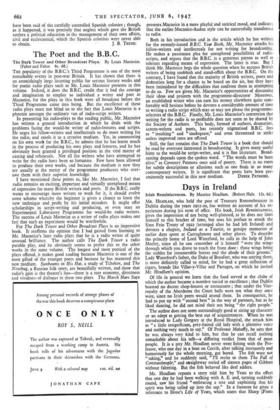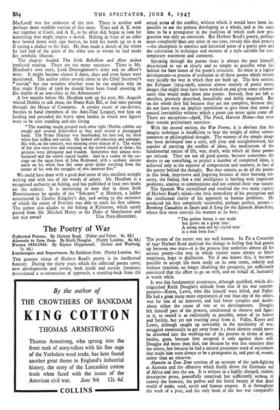Days in Ireland
Irish Reminiscences. By Maurice Headlam. (Robert Hale. 12s. 6cl.) MR. HEADLAM, who held the post of Treasury Remembrancer in Dublin during the years 1912-20, has written an account of his ex- periences during his term of office. His book, Irish Reminiscences, gives the impression of not being well-planned, as he does not limit himself to this bracket of time, but uses his preface to attack the Sinn Fein Treaty of 1922 (arranged after he had left Ireland) and devotes a chapter, Ireland as a Tourist, to gossipy memories of earlier days spent at Curraghmore and other places. To describe the princely home of Lord Waterford, he calls in the help Of John Morley, since all he can remember of it himself "were the wings through which you drove to reach the front door : those wings being the stables for innumerable horses and the abode of their grooms." Lady Waterford's father, the Duke of Beaufort, who was staying there, is more definitely called to mind, for he had a great collection of cigars, brands like Villar-y-Villar and Partagos, on which he invited Mr. Headlam's opinion.
Of life in general we learn that the food served at the clubs of which the author became a member varied in excellence ; that Dublin boasted no decent chop-houses or restaurants ; that under the Vice- royalty of the Aberdeens the Court balls were not what they once were, since no Irish peers would attend them. In consequence, he had to put up with "second best" in the way of partners, but as he liked dancing, he did not mind their not being "the right people."
The author does not seem outstandingly good at sizing up character or an adept at getting the best out of acquaintances. When he was introduced to Lady Gregory at the Royal Hospital, she struck him as "a little insignificant, grey-haired old lady with a plaintive voice and nothing very much to say." Of Professor Mahaffy, he says that he was always very kind to him, but that he can recall nothing remarkable about his talk—a differing verdict from that of most people. It is a pity Mr. Headlam never went fishing with the Pro- fessor, who one day in a boat on Corrib, after talking incessantly and humorously for the whole morning, got bored. The fish were not "taking," and he suddenly said, "I'll recite to them The Fall of Constantinople," and sWaightway reeled off sixteen pages of Gibbon without faltering. But the fish behaved like deaf adders.
Mr. Headlam repeats a story told him by Yeats to the effect that one day he had been walking with A. E. and, turning suddenly round, saw his friend "embracing a tree and explaining that his spirit was being called up into the sap." In a footnote he gives a reference to Hone's Life of Yeats, which states that Sharp (Fiona MacLeod) was the embracer of the tree. There is another and perhaps more credible version of this story. Yeats and A. E.. went out together at Coole, and A. E., as he often did, began to look for 'Something that might inspire a sketch. Halting in front of an elder tree bowed down with ripe berries, he held his hands up to it as f raising a chalice to the fruit. He then made a sketch of the vision he had had of the spirit of the elder tree to whom he had made his symbolic libation.
The chapter headed The Irish Rebellion and After makes ;confused reading. There are too many narrators. There is Mr. .Headlam's own story, Lord Donoughmore's story and an officer's story. It might become clearer if dates, days and even hours were 'mentioned. The author refers several times to the Chief Secretary's if but one wonders whether even he can explain why on that tragic Friday of 1916 he should have been found snoozing in he depths of an arm-chair at the Athenaeum?
A few months before Mr. Headlam took up his post, Mr. Asquith visited Dublin to talk about the Home Rule Bill, at that time passing through the House of Commons. A cavalry escort of car-drivers, torches in hand (members of the Anti-Taxi League), met him on 'landing and preceded the heavy open landau in which two figures were to be seen standing and one sitting.
"The standing couple grasped each other tight (Dublin cobbles are rough) and swayed dishevelled as they each waved a disengaged hand. The Prime Minister was bareheaded, his face red, his thick white hair ruffled and untidy. He looked self-conscious and unhappy. His wife, on the contrary, was enjoying every minute of it. The waves of her arm were free and sweeping as the crowd roared at them ; his gestures were infrequent and wooden. Sometimes they almost over- balanced and the crowd roared louder. And in a comer of the car- riage sat the squat form of John Redmond, with a sardonic sinister smile on his white face like some great spider watching from the corner of his web the struggles of two innocent flies."
We could have done with a good deal more of this excellent straight writing and with less of the words of others. Mr. Headlam is a recognised authority on fishing, and has published at least two books on the subject. It is interesting to note that in these Irish Reminiscences he speaks of the "fish-pass" at Markree, a ladder constructed in Charles Kingsley's day, and owing to the existence of which the rector of Eversley was able to catch his first salmon. The author also alludes to the fishing at Kylemore, which surely passed from Mr. Mitchell Henry to the Duke of Manchester and



































 Previous page
Previous page